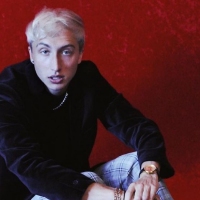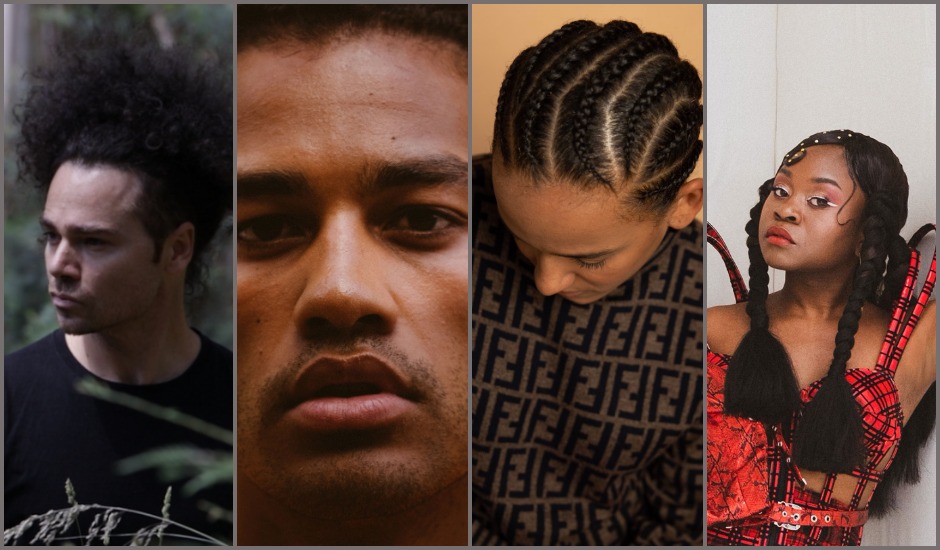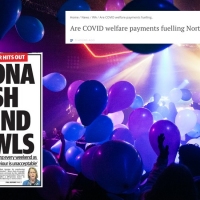 Happy. lead vocalist Tate Logan shares a message to trans musicians in the punk sceneIn a new letter, the musician - who is trans themselves - encourage people to keep pushing, even when it seems like odds are stacked against them.
Happy. lead vocalist Tate Logan shares a message to trans musicians in the punk sceneIn a new letter, the musician - who is trans themselves - encourage people to keep pushing, even when it seems like odds are stacked against them.

Australian hip-hop is more powerful than ever, and it’s time to pay attention
With global uncertainty defining 2020, Australia’s rap world is helping us understand and process the problems at its core.
TW: This article mentions and discusses Indigenous deaths, violence against Indigenous communities and people of colour, and sexual assault/harassment.
2020 has been a rollercoaster of a year - but you probably already know that. It’s not uncommon for news reports to be 100% negative; disheartening pandemic updates one minute, confronting reports of the deaths of Indigenous Australians in custody and Black Americans at the hands of police the next. There have been near-weekly reports of sexual assault and harassment through cases spread across Australia - in niches such as music, too - and on top of that, we’re expected to go on like nothing’s happening; the expectation remaining in place that business is usual, even under circumstances that none of us - nor any of our living relatives, most likely - have ever endured.
There’s always the saying that “through struggle comes art” and even though it feels somewhat dystopian to think about, art - through various mediums - has been something that’s really helped a lot of people through the last six months or so. While the US fought in the name of George Floyd, Black musicians - particularly in hip-hop - made music that’ll define the art in the context of these times. Throughout coronavirus, artists of all means have worked to process emotions through their work - through albums recorded in lockdown, to paintings and images of empty streets - in a way that allows us to process ours too. Even amongst a wave of sexual harassment and assault allegations through the music industry, people have bound together with the purpose of supporting one another through art, via the means of both social media groups and pop music covers alike.
It’s a draining time to be an artist of any kind, with entertainment, culture and art income streams dried to a small puddle with pandemic restrictions and the rest. However, much of what’s coming from that small puddle is as powerful and potent as it has perhaps ever been; passionate with emotional intensity - and tiredness - that for many, represents how they feel better than anyone else could put into words.
In the context of music specifically, this turbulent period has welcomed empowerment and weakness alike. As much as music feels as influential and legitimising than it’s been in decades, it’s also its most solemn and complex at times; a natural bell curve of emotions that represent the thoughts and feelings of a greater world, one that feels both commanding and drained simultaneously.
Internationally, it very much feels like a new generation of protest music (more often than not) is being born. You have artists notorious for their politically-aware work - Run The Jewels an obvious example - release music that feels a little more urgent for the current times; Terrace Martin enlist an ensemble of musicians for a recollection of Black America’s emotions (“I got together with Black men that felt the same way and created a work of truth,”); Anderson .Paak reflect on current-day racial prejudice on Juneteenth alongside same-day-released work by Alicia Keys and Kamaiyah; Noname disguise social activism through heavily-publicised rap beef and even Sufjan Stevens - the hero of America’s white indie class - reflects on America’s disillusionment and suffering.
While Australia is slightly removed from the George Floyd protests specifically and the brunt of coronavirus’ international dominance, the conversations have inspired many centric to Australia’s own issues. In turn with the US, our own racism has been shone under a light; both in regards to Indigenous Australians and those migrating to Australia from elsewhere. Furthermore, conversations of our ‘bro culture’ - plus the relaxed attitude of Australians that encourage those to turn a blind eye - and its effects on women and queer Australians, including trans and non-binary people.
As a result, our own music scene is finding itself empowered and in-tune with the current day conversations, even if you have to dig a little deeper then world-renowned hip-hop super-groups to find them. Much like in the US, the last few months have brought some of Australia’s most important and essential musical work, whether it be music videos that amplify messages a little more potent in the current circumstances - such as Sampa The Great’s ARIA-aimed Time’s Up! - or full-length projects that encapsulate a generation of Australian musicians sick to death of today’s world, and are in search of making - and influencing - change.
On par with those in the US, a lot of this art comes from those disadvantaged due to the ongoing matters of the world: the Indigenous Australians, people of colour, women, trans and non-binary folk, queer people, and the list continues. Because of that, a lot of this work is stemming from our hip-hop scene - where people of colour and Indigenous Australians are heavier represented, comparative to pop and electronica for example.
It’s important, because for the longest time, Australia’s hip-hop world felt very surface-level in the public eye. Our biggest flag-bearers were white, label-pushed heavyweights; groups that earnt their place in the hip-hop canon, but through music that doesn’t exactly reflect the battles and triumphs of rappers who have been through the struggles their genre is built from. A shift is happening; Indigenous Australians, for example, are becoming globally recognised for their musical prowess - The Kid Laroi., for example, is one of Australia’s most successful hip-hop exports in years - while back home, those that emphasise these experiences and messages are being amplified, and with that, their stories become amplified too.
Ziggy Ramo - the Sydney-via-Arnhem Land rapper who shared his debut album earlier this year - is one of Australia’s most powerful examples of a rapper leading the way with authentic, educational messages through hip-hop. His debut album Black Thoughts was actually recorded five years ago, but shelved as he thought it contained messages that people wouldn’t be able to digest without controversy. However, just a week after George Floyd’s death ignited protests across the US - and relevant, Australia-specific conversations too - Ziggy Ramo chose to release the record.
It’s an album reflective of a battered and damaged communicator, one written in the depths of his low points as a way to process his emotions and leave a legacy to be dissected and learnt from in the future. It’s his culture - culture, full-stop - distilled into stories and the knowledge that you can find within, fuelled by the anger and frustration that comes with being so disassociated with those that control you, right down to those in the industry you’re hoping to change.
In the time since Black Thoughts’ arrival, Ziggy Ramo hasn’t stopped either. He’s consistently placed his story in the forefront time and time again, with the hopes of reaching more people to emerge themselves in his album, and come out the other end more knowledgeable and in-touch with a culture that stems long beyond your existence.
Even just last night, invited to talk and perform on ABC’s Q&A program, Ziggy proved the prejudices that hold his community down; his invitation to talk on the program watered down due to the network refusing to allow the performance of Black Thoughts’ most powerful song. “I do celebrate the Anzacs. I’ve gone to the other side of the world on Anzac Day to celebrate what our people have laid down for us,” he spoke, told that his performance of April 25th would be offensive, due to its anti-ANZAC lyricism. “So if we’ve done that, we can’t just pick parts of our history that we want to recognise and bury the others. If in World War II we fought against genocide, yet we don’t recognise the genocide in our own country, that’s a double standard.”
Another musician within this realm is OKENYO, whose work has constantly played with socio-political themes for as long as she’s been releasing music under the name. Her latest single Anthropology is one rooted in identity and the expression of who she is, claiming her space as a Black woman - and a Black, female musician - and challenge those who stand against her to face their power and privilege.
“As an artist, I am constantly thinking about humanity, our behaviour, where we’ve been and where we’re going,” she explains. “Throughout history and through the white lens, the black body and black culture have become an object of obsession and exoticism. By putting myself at the centre of the piece as the artwork itself I am asking the audience to challenge their perception of power, privilege and what it means to take.”
It captures OKENYO in her prime, standing tall and empowered as she thrives with her identity, whether that be racially, sexually, or in regards to gender. “In a battle between who I feel I am and who people expect me to be, the word ‘NO’ burst out of me with the rest of the lyrics running like a bull out the gate. My identity whether it be tied to race, gender or sexuality belongs to me only and Anthropology is a moment for me to own that regardless of what others may seek from me. Take your hands off my biology.”
In R&B, Pitjantjatjara woman Miiesha has proved one of Australia’s most talented storytellers. Her debut album Nyaaringu is an experience, one that dives within the history of her Central Queensland community of Woorabinda, and pays homage to those who have helped her journey physically, mentally and spiritually. It’s deep in conversations about race, identity, self-worth and the intersection of these, building off the stories of her family and greater community through music that can only be described as enchanting.
Kee’ahn is another within the R&B space, her debut single Better Things reflecting a feeling of being alone in a new city through the lens of someone that feels it on a greater cultural level too, as a Gugu Yalanji and Jirrbal musician thousands of kilometers away from the culture that built her up. “As a First Nations woman, my connection to music is strong because of my connection to my culture,” she explains. “I come from a long line of disruptors. My matriarchs were told to quieten their voices, but our stories were always shared and heard.”
As long as the injustices these musicians speak of continue to exist, then they will continue to be the focal point and foundation of some of culture’s most powerful and important work. Drmngnow is someone whose work constantly dissects the systems set in place, those that work against allowing someone like Drmngnow to become the cultural focal point they are now. Their latest single Never Defeated is resilient, but heart-breakingly and frustratingly so. “It's 2020, many of us can't breathe under these current predicaments but we still have breath. I have breath. Fortunately, enough to have life, enough to speak, enough to make music.”
Briggs’ work will always continue to fight, and inspire those around him to fight alongside. The rapper needs no introduction both as a solo musician and as one-half of A.B. Original, and neither does the things he fights for, with Go To War - featuring Thelma Plum - being yet another example: “It talks to the idea of the ‘palatable black’ and the way Australia looks fondly at having dot paintings in their house, and ochre’d Aboriginal people dancing and practising traditions but looks down their nose at Blackfullas in the street because they don’t fit their absurd notion of a ‘True Aboriginal’. You can’t reduce someone’s identity and connection to culture because they’re not wearing the suit you associate them with.”
You have rappers such Tasman Keith highlighting and processing their own struggles; Genesis Owusu’s Whip Cracker being one of the year’s most powerful and raw musical moments; groups like ONEFOUR having the world against them as they show how you can overcome systemic disadvantages and still prosper; artists like L FRESH THE LION wearing everything on their sleeve, but especially the culture that have helped them get to where they are today.
This list of powerful Australian musicians is growing and with it, becoming louder and louder. Their messages and experiences are becoming more prevalent, harder to hide yourself from, more difficult to turn a blind eye like some people have been doing for so long. Soon, you’ll have no choice but to pay attention.
 Happy. lead vocalist Tate Logan shares a message to trans musicians in the punk sceneIn a new letter, the musician - who is trans themselves - encourage people to keep pushing, even when it seems like odds are stacked against them.
Happy. lead vocalist Tate Logan shares a message to trans musicians in the punk sceneIn a new letter, the musician - who is trans themselves - encourage people to keep pushing, even when it seems like odds are stacked against them.
 First coronavirus, now media bashings: Perth nightlife culture can’t catch a breakPerth’s nightlife was completely destroyed by coronavirus, and is only just beginning to recover. Some people, however, think it should stay shut.
First coronavirus, now media bashings: Perth nightlife culture can’t catch a breakPerth’s nightlife was completely destroyed by coronavirus, and is only just beginning to recover. Some people, however, think it should stay shut.